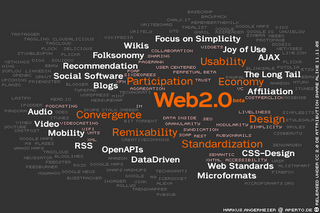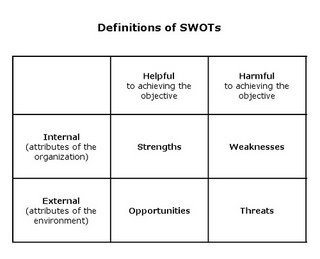Some days back my thoughts overcame the hibernation mode, which was imposed by work from long time. This time I was thinking about Internet.
What about Internet? About its future.
Ever wondered some of us praise that British people of 16-17th century that they would plan keeping hundreds of years in vision. But one can bet that British policy would be total failure in today’s world, as if one keeps in mind the transition with which technology changes then one cannot predict next 15-20 years even.
Then what would be Internet in Future? Here I am assuming that you all know the past of Internet. :)
We can answer this question from infinite dimensions, but I would answer this only from 2 of them.
Web2.0
Some of regular net surfers would have come across the term Web2.0. Let us have brief introduction about it. This term was first coined by Dale Dougherty (Co-Founder of O’Reilly) during a brainstorming session in the conference hosted by O’Reilly Media and MediaLive International in 2004. Web2.0 created so much hype that first Web 2.0 Conference was held in October, 2004.
I know many questions would be arising in your mind. What is Web2.0? How will change whole scenario of current Internet? How will affect us?
There is no exact definition given for Web2.0, only some examples were given to differentiate Web2.0 with current Web (Consider it to be as Web1.0), some of them are
Web1.0 -> Web2.0
DoubleClick -> Google AdSense
Ofoto -> Flickr
Domain name speculation -> search engine optimization
Directories (taxonomy) -> syndication
Let us hear words from originators itself: “Like many important concepts, Web 2.0 doesn't have a hard boundary, but rather, a gravitational core.”
Visualization of Web2.0
Some of mavens say that Web2.0 is nothing but mere another buzzword, which can be classified broadly as marketing hype created so that some of the companies are benefited from it. While some of them say that Web2.0 will help in replacing PC platform with net platform in the same as PC replaced Minicomputers and Mainframes long time ago.
Now let us see what are changes keeping technology in view are in store for Web2.0. Web2.0 will be consisting of all the words that are present in the Visualization of Web2.0 figure.
Some of the problems that are being faced Web2.0. Experts are saying that Web2.0 is often synchronized with AJAX, and AJAX is considered to be as catholicon. But that is faux-meme. So one should evolve other such technology.
Semantic Web
Definition of Semantic Web: The Semantic Web is an extension of the current Web that will allow you to find, share, and combine information more easily. It relies on machine-readable information and metadata expressed in RDF.
Semantic Web Definition
The Semantic Web is about two things. It is about common formats for interchange of data, where on the original Web we only had interchange of documents. Also it is about language for recording how the data relates to real world objects. That allows a person, or a machine, to start off in one database, and then move through an unending set of databases which are connected not by wires but by being about the same thing.
In short means standardize all your data and encode it in XML.
Who will rule Web2.0 or SW?
Both Web2.0 and SW are polar opposite. Web2.0 emphasis on ‘let people create, collaborate, share and interact’. Who cares what the back-end uses, or how it does it just gives “Power To The People”, quickly and efficiently. Whilst SW speaks totally opposite. To recapitulate Web 2.0 is about high-level (user experience) and immediate benefits, the SW is a low-level (data), long-term solution.
What are Google’s plans about Internet?
Google, who emerged as giant in software industry, is working hard for Web2.0. Also it is trying to corner Microsoft in its core competency i.e. Desktop applications. It would be better if you go through the following link.
Google’s Future Plans
Reference: O'Reilly Clarifications about Web2.0, Web2.0 Problems, Semantic Web.





